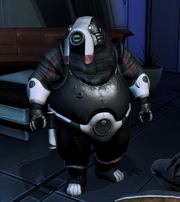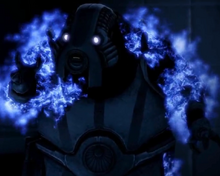
A sapient species from the planet Irune. The Vol Protectorate is a client of the Turian Hierarchy.
Biology[]
The volus homeworld features an ammonia-based ecology and a gravitational field 1.5 times that of Earth, as well as a high-pressure atmosphere. As such, the volus are short, rotund and compact. They're unable to survive unprotected in an atmosphere more suitable to humans and other carbon-based lifeforms, and thus require protective suits capable of providing the proper atmospheric composition and pressure. Traditional nitrogen/oxygen air mixtures are poisonous to them, and in the low pressure atmospheres tolerable to most species, their flesh will actually split open.
Volus possess flaps of skin at their throat; these assist in breathing and speech.
Volus also have cloacae.
What happens when a volus suit is ruptured? Explained here.
Politics[]
The Vol Protectorate is a client state of the Hierarchy, which receives taxation and handles all matters of foreign affairs. In exchange, the volus, who are physically unsuited to warfare relative to their galactic neighbours, enjoy the protection of the powerful Hierarchy military.
The influence of the volus shouldn't be underestimated, however. They are far more powerful than any other Hierarchy client. The volus can be considered the architects of the current galactic economy, creating the "credit" standard currency, and continuing to monitor and balance the apparatus of interstellar trade. Volus companies are skilled at mass-producing whatever manufactured goods are currently in demand. Factories use modular equipment to switch their production lines from arms, to housing, to the next big galactic-buying trend.

Some people distrust volus because of the enormous influence they have on the galactic economy. See: Volanti.
Volus are tribal by nature, but non-violent. Volus government is malleable and changeable, in contrast to that of the elcor. Large tribes and clans often engulf smaller ones, only to later split again.
Culture[]
Volus culture is dominated by trade, whether it’s of land, resources, or tribe members. The volus have a reputation as bankers and merchants, and many, such as Barla Von, work as some of the best financial advisers in Citadel space.
There were once entire tribes dedicated to the martial craft, raising their sons as soldiers and then trading them to other tribes in exchange for goods and services. Some suspect that this is the reason the volus are on such good terms with the turians, as the basis for their relationship with the Hierarchy was already inherent in their culture. Most of these tribes have long since been reabsorbed and their names erased; the volus are among the least war-like races in the galaxy. Some militant clans still exist, but they’re small and dwindling, and only exist because they refuse to trade themselves into the greater tribes, no matter the offers of wealth.
Most of the works by the author Polan are about such tribes, and the conflicting feelings the volus have about them. The stories typically involve brothers trading themselves off to two different tribes who then go to war with each other. Most of these are rather melodramatic.
A volus sport is Stickmatch.
Celebrations include Yintal.
Religion[]
A major volus religion involves the Book of Plenix. A common misconception among non-volus is that “Plenix” refers to a particular god or prophet; this isn’t the case. While some clans do worship certain deities, The Book of Plenix makes no reference to any of them, other than to acknowledge that such practices exist. “Plenix” instead refers to what can best be described as the “currency of the universe”, a similar concept to “Karma”. Followers of Plenix believe that one’s soul is part of a great, spiritual economy that uses Plenix as its main currency. One earns Plenix by performing good deeds, as defined by The Book of Plenix, and spends Plenix when he or she encounters good fortune or performs a bad deed. The soul will continue to exist within the spiritual economy after death, so it’s encouraged that one save as much Plenix as possible during their lifetime, it being easier for a living soul to earn Plenix than a dead one.

Volus gods do not, in fact, include Niftu Cal.
Volus gods include the following:
- Bryn Buhl Sed (see: Yintal)
- Cherk Sab (a deity governing luck, originating in one of the northern regions)
- Kada Bin (a god of justice)
- Kyuu Din (god of tribe and hospitality)
- Las Kohar (god of the sky)
- Praush Ilks (a god of fortunes)
- Teil Dor (apparently a god of fruitful progeny)
- Umbag Thu (a deity of comprehension and teaching)
- Zada Ban (a god of punishment)
- Zubii Hesh
There was no god of dreams, as explained here.
Most historical religions of the different clans (that is, pre-Plenix) lacked a clear idea of an afterlife. Most teachings were about how to live a righteous life in the present (managing one's affairs with humility and skill, being charitable and wise with possessions and wealth, taking care of the less fortunate, etc.) rather than a distant future after death.
Food And Drink[]
- Dil Lhurs
- Grund
- Hrust
- Hwaht dah guz
- Olono
- M'mmmmdalla
- Ximxam
Language[]
Even within the major, universal languages (discounting regional languages still in use), there are fourteen to seventeen different words for family and national group; humans tend to translate them all as “clan” or “tribe”, though these blanket translations are unhelpful in capturing the nuances.
Example words and phrases:
- Bovis Tor: In one of the older languages, “the shining sea”.
- Dinthen’r: Translates as something akin to “investors”, “merchants”, or “financiers”.
- Doz Atab: “Sky warden”.
- Felethmar: Loosely translated, ruffians, hooligans, ne’er-do-wells.
- Ithq: “Coffin”, “tomb”, or interestingly enough something that translates as “cheese” (presumably an idiomatic meaning.)
- Jonn hem jin: Traditional caretakers for the feeble-minded or mentally infirm.
- Kun-lat (kun’lat): A moderate profanity, equivalent of the Terran word "bullshit".
- Peek’a: Equivalent to ‘crap!’.
- Quati’manra: Essentially, xenophobia or extreme nationalism; exclusive preference for one’s own. It has negative connotations, suggestive of poor decision making or moral inferiority. This is a consequence of the fluid and changeable nature of volus tribal society, wherein exchange between tribes is considered normal and essential.
- Thoqi: “Other”, “secondary”, “water-based”.
- Urth-mai: Ammonia.
- Vem Osca: In Iperian Volus, “weeping witness”.
- Vim boolla: Youth unready to be traded away from their parents but participating in Vol tribal politics and finance in subordinate roles. An "adolescent" phase.
- Vwish kya: Life-bearing planets that are inhospitable to volus.
- Welm Orun: “The golden one”.
Early volus music was purely vocal, perhaps with stones striking against each other for rhythm. They’ve also added alien instruments to their repertoire, although creating the pressure environments on stage is only for the more popular artists who can afford such extravagance.
Volus Territory[]
Volus territory has expanded ten-fold since their admittance to the Citadel.
- Irune - homeworld
- Alahya - a moon of Dranen undergoing ecological alteration for a future volus colony
- Boro
- Daleon
- Dar Mindon
- Maskawa
- Selen
- Talis Fia
- Zada Ban
Home System of Aru:[]
Jak Ser: This planet features heavily in ancient volus mythology and folklore, since its bright white surface made it easy to chart in the night sky, without the aid of a telescope. Once the volus developed advanced astronomical equipment, their scientists discovered that Jak Ser’s luminosity was caused by a thick carbon monoxide cloud cover that had hidden the real face of the planet for millennia.
Locil: The first of the Aru system’s three gas giants, Locil is also the largest. Boasting over 96 moons, the planet’s orbit bustled with hundreds of helium-3 extraction centres. Most of the work population lived on Locil’s orbital stations, which were so numerous they became an unofficial city, chained together by taxi services and extendable umbilical cords.
Notable Volus[]
See also: Volus (list)
History[]
As a result of the challenging climate of Irune, explorers were valued for what they brought back, not for being first. If what you found didn’t have value of some sort, it, and you, were without worth. The tight-packed nests and burrows emphasized unity and organization, especially when multiple clans congregated together to form the first cities, about 10,000 years ago. Personal worth, and being of service to the clan, dominated volus thinking from very early times, and continue to do so in the present.
In the great volus exploration push of 300 BCE, the species found only a few planets capable of supporting their colonies. They did, however, discover many planets teeming with valuable elements. They spread across the Aethon Cluster. The Esori System was among those claimed and colonized.
The volus were the third race to discover the Citadel, and were invited to place an embassy there.
385: Talis Fia colonized. The Council agreed to fund the colonization effort in return for massive trade benefits. With uncharacteristic enthusiasm, an enormous volus influx ensued, and the Council reaped the economic benefits for a dozen years before the colonization bubble burst.
2098: Maskawa colonized.
2154: Zada Ban explored..
2180: Boro colonized.
Post-Reaper War[]
Trivia[]
A Dwick Life Lesson: Something important you should know about volus, courtesy of Dwick and Terrorbyte.
Threads of Note[]
Volus Protests on Illium: A new advertising campaign is judged offensive.
New Teen Fad Threatens Lives: Volus youth eating things they shouldn't... like water.